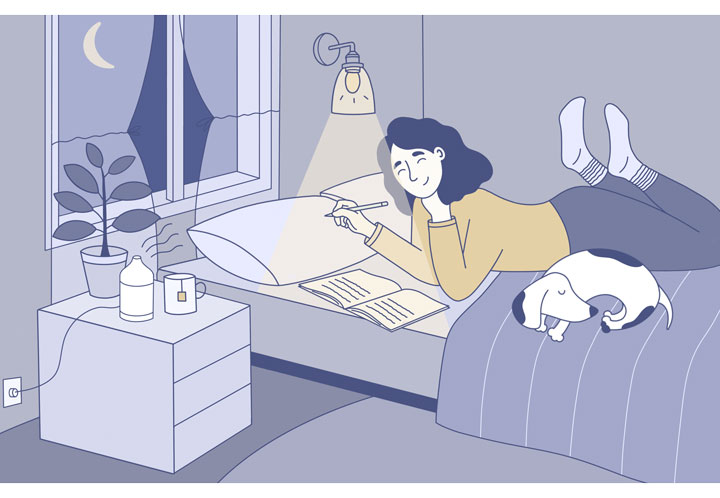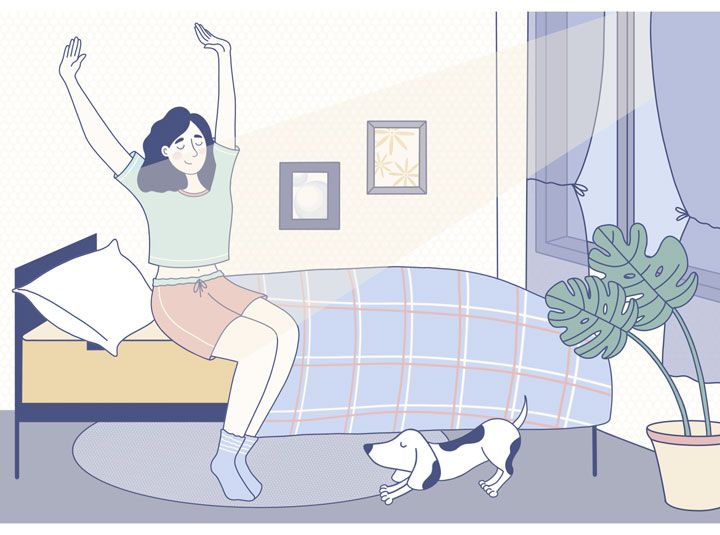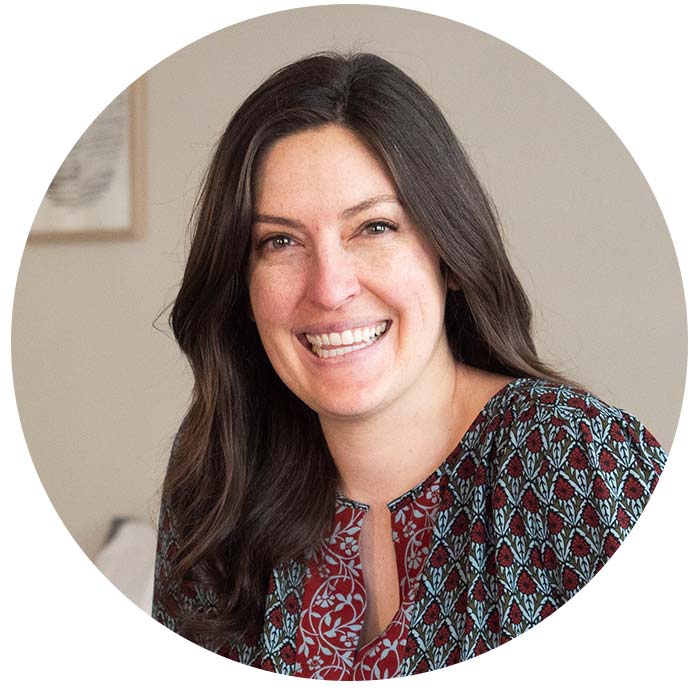Sleep is something all humans need, and yet, so much about it remains a mystery. Scientists have established the basics—that there are multiple sleep stages, and that one stage, REM sleep, is associated with learning and storing memories. However, the exact mechanisms behind sleep and dreaming are still unclear.
Research suggests that behavioral sleep habits like committing to a regular bedtime and taking time to wind down before bed can help with falling asleep and staying asleep. But there are also genetic components to sleep, making things a little more complicated.
Genes, sometimes called the “blueprint for life,” tell each cell in the human body what to do and how to do it. “Genes are made up of DNA,” the U.S. National Library of Medicine explains. “Some genes act as instructions to make molecules called proteins…Every person has two copies of each gene, one inherited from each parent. Most genes are the same in all people, but a small number of genes (less than 1% of the total) are slightly different between people. Alleles are forms of the same gene with small differences in their sequence of DNA bases. These small differences contribute to each person’s unique physical features.”
Many genes are hereditary, meaning they are passed down from a parent or relative further back. Along with physical features, genes are linked to physical health issues and other bodily functions. While there is still much to be discovered and understood about DNA, the research is clear: Genetics definitely plays a role in sleep.
This piece on how genes impact sleep will cover the links between genetics and sleep duration, sleep/wake times, sleep quality, and sleep disorders. It will also offer further reading on how genetics affect sleep.
Genetics And How Much Sleep We Need
Certain genes and gene mutations are linked to how much sleep a person needs to function while feeling rested. The Mayo Clinic recommends that adults get 7 to 9 hours of sleep each night to avoid being sleep deprived—sleep deprivation is linked to impaired memory, tiredness, trouble concentrating, feeling irritable, stress, high blood pressure, obesity, diabetes, and more.
However, genetic factors can influence how much sleep a person needs to operate at their best. Some people need much less sleep than the recommended 7-9 hours, while others require more than that.
Genetics and Sleep Length
For a study published in the journal Molecular Psychiatry in 2014, researchers gathered data from 47,180 individuals of European ancestry and 4,771 individuals of African-American ancestry. They looked at any connection between DNA and how long the subjects slept each night, and results suggest two specific regions of DNA that may be involved in typical nightly sleep duration. One DNA region was linked to shorter-than-normal sleeping times, the other was linked to longer-than-normal sleeping times.
“Sleep patterns are influenced by genetic differences,” study author Dr. Daniel Gottlieb, the director of the Sleep Disorders Center at VA Boston Healthcare System, told LiveScience. “This study is one of the first to begin identifying these genetic differences, and will hopefully help us better understand the causes of sleep disorders and their relation to other important conditions, such as diabetes and psychiatric disorders.”
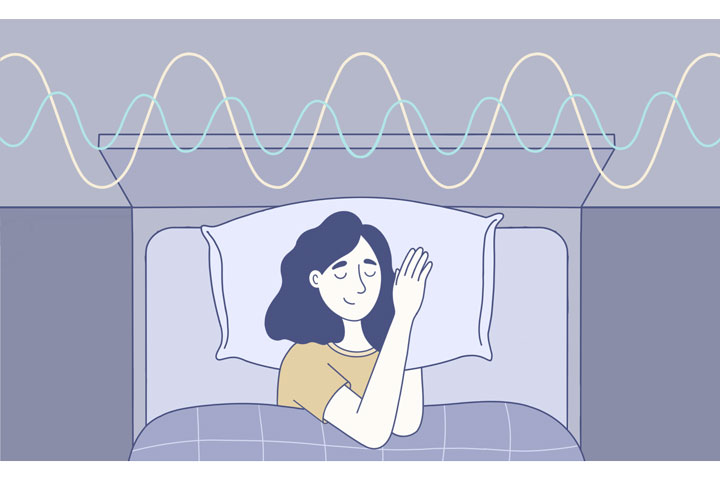
However, Dr. Jim Horne of the Sleep Research Center at Loughborough University in England, told CBS News that the study is not definitive and that the results should not be taken out of context. “The effect of these genes on sleep is tiny, accounting for no more than a few minutes of a total night’s sleep,” he said. “There are numerous mechanisms, maybe hundreds, in the brain affecting our sleep one way or another, all of which will be coded by one or more genes. Those looked at here are just a very few.”
A research team led by Dr. Ying-Hui Fu, Ph.D., professor of neurology and a member of the UCSF Weill Institute for Neurosciences, has discovered three genes linked to “natural short sleep” in humans—defined by a University of California San Francisco press release as “lifelong, nightly sleep that lasts just four to six hours yet leaves individuals feeling fully rested.” The team identifies these gene mutations in humans, then studies them in mice who are genetically-engineered to have the same mutations and compares the results to normal mice.
Dr. Fu published research in 2009 in Science magazine, detailing a gene mutation called hDEC2-P385R (often shortened to DEC2) that is associated with short sleep in humans. For a second study, published in the journal Neuron in August 2019, Dr. Fu and her fellow researchers studied a family of natural short sleepers, none of whom carried the DEC2 mutation. Instead, members of this family carried a gene mutation called ADRB1. “Natural short sleepers experience better sleep quality and sleep efficiency,” Dr. Fu said. “By studying them, we hope to learn what makes for a good night’s sleep, so that all of us can be better sleepers leading happier, healthier lives.”
The same research team published a paper in Science Translational Medicine in October 2019, after studying a father-and-son pair who average 5.5 and 4.3 hours of sleep per night—without experiencing any adverse effect of sleep deprivation. The pair both carried a rare gene mutation called NPSR1. “NPSR1 not only promotes short sleep, it also prevents memory problems that usually result from sleep deprivation,” Dr. Fu said in a press release. “This is the first gene that anyone’s discovered that exerts a protective effect against one of the many adverse consequences of sleep deprivation.”
Genetics and Sleep/Wake Times
“Our internal biological clock resides in the brain and regulates the timing of functions such as appetite, hormone release, and metabolism,” the Division of Sleep Medicine at Harvard Medical School explains. “Of all the cycles controlled by the circadian system, perhaps the most obvious is the sleep-wake cycle—when we go to sleep and when we wake up. Although our internal clock is set to approximately 24 hours, the exact timing of circadian rhythms varies from one person to the next.”
The site goes on to explain: “Genes influence how fast or slow our internal clock runs and, as a result, how closely it—and our body’s functions—align with the 24-hour day. Changes in these genes, known as mutations, from one generation to the next can affect the clock’s timing. For example, this can cause a child to have a faster or slower clock than his or her parents.”
According to a study published in the journal Nature Communications in January 2019, night owl or early bird tendencies may have genetic links. Researchers analyzed the genetics of 697,828 people using data from the UK Biobank and 23andMe, and the sleep patterns of 85,760 of those individuals. They discovered 351 genetic loci associated with “morningness”—AKA being a morning person.
“People who carried the most gene variants linked with being an early bird went to bed an average of 25 minutes earlier than those who carried the fewest,” The Scientist reported. “The team went on to study the potential roles of these gene variants, and found that many had functions in regulating circadian rhythms. Some were active in the brain, while others were active in the retina.” Other genes were associated with processing nicotine and caffeine, both stimulants, and scientists don’t yet know the function of other genes they located. “The most interesting ones are the ones where we don’t know what it is,” study author Michael Weedon told the New York Times.
Of course, genetics are not the only thing that influence sleep/wake times. “In addition to genetic influences, there are cultural, environmental, and behavioral factors that influence when and how much we sleep,” the Division of Sleep Medicine at Harvard Medical School explains. “For example, many people living in hot climates have an afternoon siesta to avoid activities in the midday sun, and consequently have shorter sleep duration at night. The amount of sleep that people obtain is also affected by medical disorders and medications.”
The Role of Acetylcholine
Researchers from the RIKEN Center for Biosystems Dynamics Research in Japan have identified two genes that may be responsible for regulating the amount of REM sleep that animals get. The study, which was conducted on mice and published in the journal Cell Reports, suggests certain receptors for the neurotransmitter acetylcholine influence REM sleep in distinct ways. Sleep researchers have believed for some time now that acetylcholine — which is released into various areas of mammals’ brains during both wakefulness and REM sleep — may play a role in sleep regulation overall and REM sleep specifically, research team leader Hiroki Ueda, team leader in the Laboratory for Synthetic Biology at the RIKEN Center and Professor of Biology at The University of Tokyo, said in an email to Mattress Clarity.
“We decided to try to evaluate the function of all the acetylcholine receptors… on the mouse genome by knocking them out one-by-one,” said Ueda. The team tested 15 genes in total. He describes this as an “unprecedentedly comprehensive” research technique in the study of REM sleep. The research drew on highly advanced genetic tools and screenings. Most notably, the researchers observed that knocking out two specific receptors — dubbed Chrm 1 and Chrm 3 — all but eliminated REM sleep in the mice. Meanwhile, knocking out just Chrm 1 reduced the total amount of REM sleep, Ueda said, while knocking out just Chrm 3-KO fragmented each REM sleep session.
“These observations indicated that these two genes have different roles in the regulation of REM sleep, implying that it may be feasible to expect that the combination of the different variations of the genes should produce a range of the amount of REM sleep,” said Ueda. “But we need to wait for further evaluation.”
All told, these findings suggest that the acetylcholine receptors Chrm 1 and Chrm 3 may be essential for the regulation of sleep in general and REM sleep more specifically.
Genetics and the Quality of Our Sleep
The quality of a night’s sleep can depend a lot on environmental factors. A noisy, bright room will not be as conducive to peaceful sleep as a cool, dark bedroom. Someone who is extremely stressed about a work project may lie awake worrying, while someone who is less stressed can fall asleep more quickly. Behavior factors play a role, for example, people may wake up in the night with heartburn after a late meal, or get up to use the bathroom after drinking alcohol or using caffeine late at night. However, sleep quality is also related to genetics.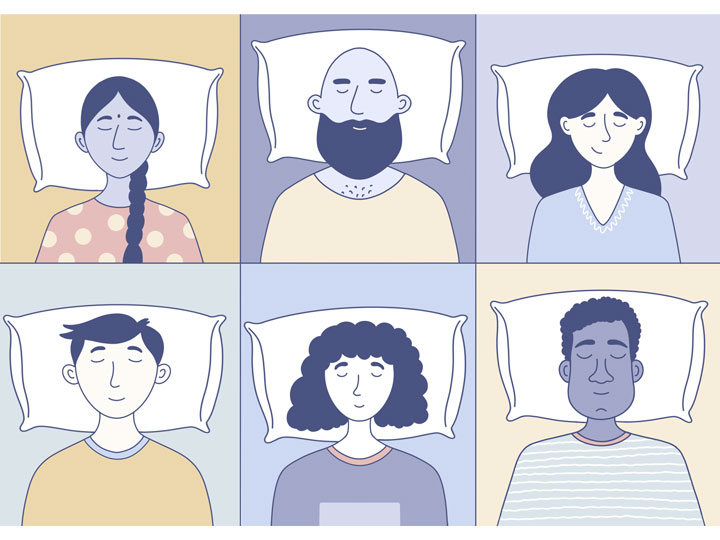
For a study published in the Journal of Sleep Research in 2013, researchers studied 1,218 middle-aged twin men using the Pittsburgh Sleep Quality Index (PSQI). People use the PSQI to answer questions about their sleep over the past one month, then researchers compile scores in seven areas: Subjective sleep quality, sleep latency (the amount of time it takes someone to fall asleep), sleep duration, habitual sleep efficiency (the percentage of time spent in bed that the person spends actually asleep), sleep disturbances, daytime dysfunction, and use of sleeping medication.
“Based on univariate twin models, 34% of variability in the global PSQI score was due to additive genetic effects (heritability) and 66% was attributed to individual-specific environmental factors,” the study’s authors wrote. They found that genes may play a role in 6 of the 7 areas, namely subjective sleep quality, sleep latency, sleep duration, habitual sleep efficiency, sleep disturbances, and daytime dysfunction.
Basically, this means there may be genetic components to sleep quality, how long it takes someone to fall asleep, how long they typically sleep for each night, whether or not they suffer from sleep disturbances, and whether they feel dysfunctional during the day due to tiredness or other sleep-related issues. These things can also be influenced by the environment, but the study identified heritability factors ranging from .15 to .31. What does that actually mean? The U.S National Library of Medicine explains that heritability is measured on a scale from 0 to 1. A trait with a heritability of 0 is fully influenced by the environment, whereas a trait with a heritability of 1 is totally genetic.
“Characteristics such as religion, language spoken, and political preference have a heritability of zero because they are not under genetic control,” the site explains. “A heritability close to one indicates that almost all of the variability in a trait comes from genetic differences, with very little contribution from environmental factors. Many disorders that are caused by mutations in single genes, such as phenylketonuria (PKU), have high heritability. Most complex traits in people, such as intelligence and multifactorial diseases, have a heritability somewhere in the middle, suggesting that their variability is due to a combination of genetic and environmental factors.”
The findings of the Journal of Sleep Research 2013 study indicate that there is a genetic factor to some sleep behaviors and patterns. The researchers concluded: “The next step may be to identify specific environmental factors and specific genes that influence sleep quality and disorders in order to focus prevention and intervention strategies.”
Sleep Disorders Tied to Genetics
A number of diseases and medical conditions are linked to hereditary genetic material, and sleep disorders are no different. Sleep disorders vary from conditions like insomnia, where someone has trouble falling asleep or staying asleep, to conditions like restless leg syndrome, which the Mayo Clinic defines as “an uncontrollable urge to move your legs, usually because of an uncomfortable sensation.”
- Back in 2011, a research paper published in Cell stated that roughly 14 genetic mutations were linked to sleep disorders including narcolepsy and restless leg syndrome. According to this paper:
- 60% of people who have restless leg syndrome also report that family members had the condition“Familial Advanced Sleep Phase Syndrome (FASPS) is caused by mutations in human clock-related genes.” People with FASPS consistently go to sleep extremely early and wake up extremely early, for example waking up between 1 a.m. and 3 a.m., and going to bed between 6 p.m. and 8 p.m.
- For some sleep disorders, like insomnia, research shows “genetic effects or familial clustering, but no specific genes are yet implicated”
- Some genetic traits can put someone at risk for obstructive sleep apnea, a condition where the muscles of the throat relax during sleep and block the airway. “Numerous genetically influenced or physiologic factors can contribute to upper-airway collapse, including anatomical features (e.g., craniofacial features), reduced dilator muscle activity during sleep, decreased end-expiratory lung volume, ventilatory control instability, and sleep-state instability, although obesity may outweigh these other predispositions,” the paper explains.
The ideal treatment for sleep disorders depends entirely on the person and symptoms. Physicians may recommend lifestyle changes, medication, or both. Some rare conditions, like FASPS, can only be managed rather than cured.
Summary
As it turns out, genetics play a role in almost every facet of sleep, and there is still much to be discovered about these links. However, that does not mean that behavior and environment are irrelevant.
Experts recommend practicing good sleep hygiene and establishing a strong routine, regardless of any genetic components that affect sleep. The best way to get consistent, high-quality sleep is to:
- Go to bed at the same time each night and wake up at the same time each morning, even on the weekends
- Keep the bedroom cool, dark, and quiet during sleeping hours
- Avoid looking at screens for at least an hour before bed
- Following a familiar bedtime routine each night to help the body “wind down” and get ready for sleep
- Using the bed for sleep and sex only
- Cutting off caffeine in the evening
- Limiting alcohol and fatty foods late at night
People who experience sleep problems or sleep disorders should consult their physicians about recommended next steps.
Further reading:
- Help Me Understand Genetics — U.S. National Library of Medicine
- Individual Variation and the Genetics of Sleep — Division of Sleep Medicine at Harvard Medical School
- Sleep and Genes — Stanford Magazine
- What Happens to Your Body When You Don’t Get Enough Sleep — Cleveland Clinic
[Editor’s Note: The content provided on this site is for general informational purposes only. Any medical information provided is not a substitute for professional medical advice. We encourage you to consult with the appropriate health expert if you have concerns.]

